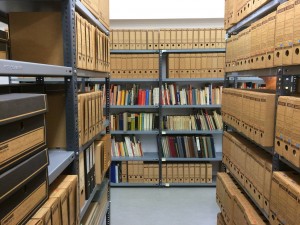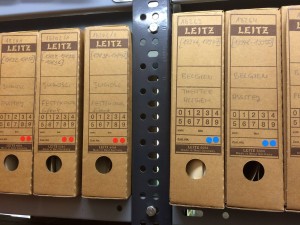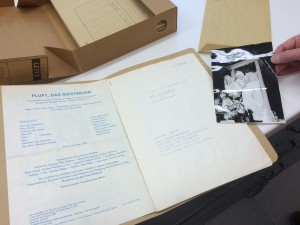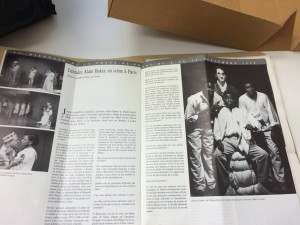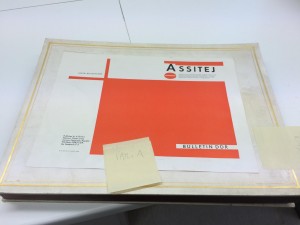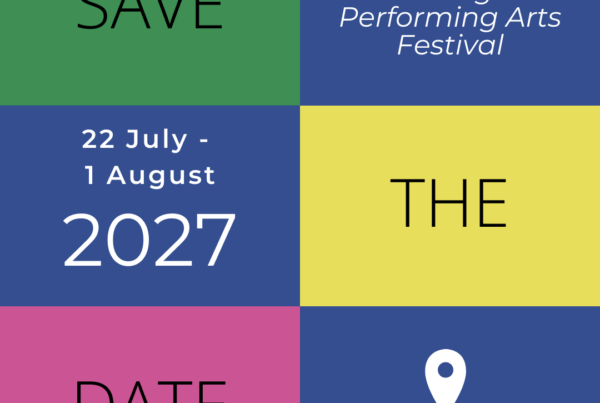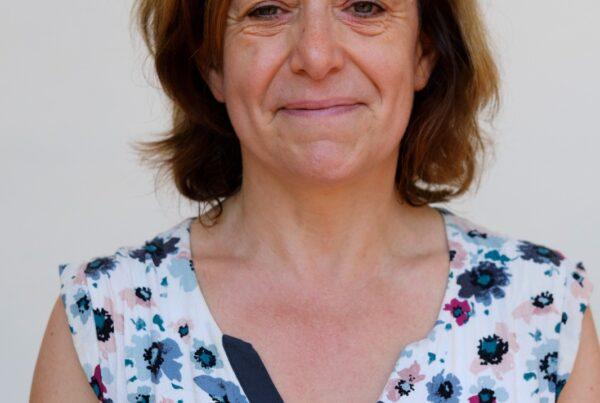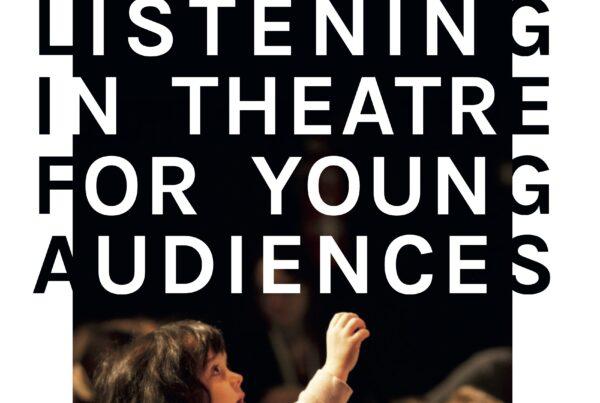In Berlin, we visited the KJTZ archives guided by the man in charge Jürgen Kirschner. These archives are located in Berlin, Munich and Frankfurt. In the Berlin archives one can find the historical materials of ASSITEJ and its centers around the world.
„Once upon a time“, a quotation from the beginning of fairy tales, and we know fairy tales play a great role in the history of ASSITEJ. Once upon a time there was an idea, the idea of peace and humanity, there was a utopia of a world of friendship and solidarity, there was a group of theatre artists performing for children and young people, using this opportunity in making life better.
Once upon a time, it was the time of Cold War, after World War 2 a political situation where the world was divided in two parts. And no where else it was more recognized as in this city with a wall between East and West. Berlin was the focus of international politics, front in front two different systems. A bad situation, but good to know that theatre artists analyse this situation, were reflecting a future in better conditions and were active in networking: Through the stories on stage, through the aesthetic communication with the young audience and through the exchange of the artistic works they built up the „Association International de Théâtre pour l’Enfance et la Jeunesse“.
They met in Europe, with the Americans, they met in London, East-Berlin and finally in Paris to found an association. ASSITEJ was born, in 1965: with member countries, like a little version of the United Nations; with an Executive Committee and a Secretary General, like a little version of a Communist Party; with a constitution, congresses and conferences, like a little version of all the other international non-governmental organisations.
Today we celebrate 50 years of ASIITEJ. 50 years of meetings and exchange and networking. For example during festivals, first of all in Europe, later in all continents, mostly in the global North, more and more in the Southern Hemisphere: to meet theatre artists and to present performances, as a symbolic action of one theatre world, with a political statement, to save the human right of children’s and young people’s participation in the performing arts. Festivals were and are the meeting points of ASSITEJ. For decades the Biennale of Lyon has been an important place, for experiences, for discussions, for project planning.
Spiders in the web were the Secretariat and their board members. Rose Marie Moudoues in Paris, Michael Ramlöse in Kopenhagen, Niclas Malmcrona in Stockholm, Ivica Simic in Zagreb and since last year Marissa Gimenez Cacho in Mexico. Representatives were the presidents among others Nat Eak, Ilse Rodenberg, Hildegard Bergfeld, Adolph Shapiro and Michael FitzGerald. Two presidents are represented, the present and the past, as hosts of this Birthday Party.
The history of ASSITEJ is not only one history. There are many histories, many stories from he and her, individual memories. My individual memories are dedicated to a variety of anecdotes, with Razi Amitai in Aberystwyth, with Galya Kolosova at the Copacabana, with Kim Peter Kovacs in the valley of Petra, with Paul Harman on the Red Square in Moscow, with Hope Azeda on stage in Montreal, with Yohei Hitchikata singing Goethe’s „Heideröslein“ in Nairobi and Peter Rinderknecht and one night in the Victoria Falls Hotel. It sounds that ASSITEJ is like a travel agency. Yes it is, but with results: n projects and programmes, in yearbooks and magazines, the ASSITEJ Award for Artistic Excellency and conferences as „How to study TYA?“
My career with ASSITEJ started – of course – through festivals, first the „Schauspiele“ in Munich 1985 where Jürgen Flügge, later vice president of ASSITEJ International and Chair of ASSITEJ Germany, advised me to be the minute taker of the German Board, and 1987 in Adelaide where I was invited for a lecture about „From Children’s Books to Children’s Theatre“ to my first World Congress. I remember very well the passion of the national delegates, the mission of the international committee, the controversy debate about Theatre with Children and Theatre for Children, about political correctness in formulating criteria of quality, about the euro centric attitudes of the artists in contradiction to the Australian, Anglo-American coalition. It was the time of changes, 1990 in Stockholm, 1993 in Havana, 1996 in Rostov on Don, 1990 in Tromsø – a permanent process of transformations. 2002 the first Congress in Asia: I was elected in Seoul, re-elected in Montreal and (again) in Adelaide.
30 from 50 years I had the great pleasure to accompany ASSITEJ. I will not miss any hour with all the festivals, conferences and meetings. ASSITEJ is my volunteer job, to give space for creativity, to give access for participation, to give support for artistic development. Together with compressions it is good to save structures for international exchange. Because internationality is an important tool in our global world. More than ever, from Cold War to our days with war for example in Syria and Ukraine, in times of migration and the permanence of profit oriented capitalism. ASSITEJ is our strategic instrument for an Educational and Cultural Policy with the Performing Arts: an idea, and not once upon a time, but at any time, to manage TYA as a model of life art. Happy birthday, ASSITEJ!
* The text based on his speech from the Ceremony for 50 Years of ASSITEJ on 22nd of April 2015 in the framework of the festival “Augenblick Mal! “ and the ASSITEJ Artistic Gathering 2015 in the Umweltforum Berlin
** Professor Dr. Wolfgang Schneider, Director of the Department of Cultural Policy at the University of Hildesheim, UNESCO Chair in Cultural Policy for the Arts in Development, Chair of ASSITEJ Germany, Honorary President of the International Association of Theatre for Children and Young People.

